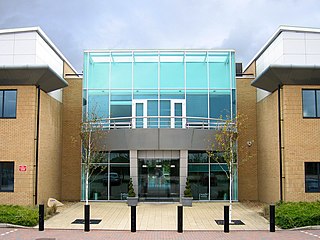Software engineering is the systematic application of engineering approaches to the development of software. Software engineering is a branch of computing science.
ARM, previously Advanced RISC Machine, originally Acorn RISC Machine, is a family of reduced instruction set computing (RISC) architectures for computer processors, configured for various environments. Arm Holdings develops the architecture and licenses it to other companies, who design their own products that implement one of those architectures—including systems-on-chips (SoC) and systems-on-modules (SoM) that incorporate memory, interfaces, radios, etc. It also designs cores that implement this instruction set and licenses these designs to a number of companies that incorporate those core designs into their own products.
ARM7 is a group of older 32-bit RISC ARM processor cores licensed by ARM Holdings for microcontroller use. The ARM7 core family consists of ARM700, ARM710, ARM7DI, ARM710a, ARM720T, ARM740T, ARM710T, ARM7TDMI, ARM7TDMI-S, ARM7EJ-S. The ARM7TDMI and ARM7TDMI-S were the most popular cores of the family.
Jazelle DBX is an extension that allows some ARM processors to execute Java bytecode in hardware as a third execution state alongside the existing ARM and Thumb modes. Jazelle functionality was specified in the ARMv5TEJ architecture and the first processor with Jazelle technology was the ARM926EJ-S. Jazelle is denoted by a "J" appended to the CPU name, except for post-v5 cores where it is required for architecture conformance.
The International Software Testing Qualifications Board (ISTQB) is a software testing certification board that operates internationally. Founded in Edinburgh in November 2002, the ISTQB is a non-profit association legally registered in Belgium.
SEGGER Microcontroller, founded in 1992, is a private company active in the industry of Embedded Systems. It provides software libraries plus programming and development tools. SEGGER produces debug probes, with accompanying debugger and performance analyzer software, plus communication and security software. The company is headquartered in Monheim am Rhein, Germany with US offices in Gardner, Massachusetts and Milpitas, California.
Professional certifications in computer technology are non-degree awards made to those who have achieved qualifications specified by a certifying authority. Depending on the particular certification, qualifications may include completing a course of study, proof of professional accomplishments, achieving a specified grade on an examination. The intention is to establish that an individual holding a certification is technically qualified to hold certain types of position within the field.
Apple certification programs are IT professional certifications for Apple Inc. products. They are designed to create a high level of technical proficiency among Macintosh service technicians, help desk support, technical support, system administrators, and professional users. Apple certification exams are offered at Prometric testing centers and Apple Authorized Training Centers, as well as online through Pearson Vue.
Android Package (APK) is the package file format used by the Android operating system for distribution and installation of mobile apps, mobile games and middleware.

Arm Holdings is a global semiconductor and software design company, owned by the Japanese SoftBank Group and its Vision Fund. With its global headquarters in Cambridgeshire, in the United Kingdom, and its US headquarters in San Jose, California, its primary business is in the design of ARM processors (CPUs), although it also designs other chips; and software development tools under the DS-5, RealView and Keil brands, as well as systems and platforms, system-on-a-chip (SoC) infrastructure and software. As a "holding" company, it also holds shares of other companies. It is considered to be market dominant for processors in mobile phones, tablet computers and for chips in smart TVs and in total over 160 billion chips have been made for all kinds of devices based on designs from Arm. The company is one of the best-known "Silicon Fen" companies.

Linaro is an engineering organization that works on free and open-source software such as the Linux kernel, the GNU Compiler Collection (GCC), power management, graphics and multimedia interfaces for the Arm family of instruction sets and implementations thereof as well as for the Heterogeneous System Architecture (HSA). The company provides a collaborative engineering forum for companies to share engineering resource and funding to solve common problems on Arm software.

The ARM Cortex-A8 is a 32-bit processor core licensed by ARM Holdings implementing the ARMv7-A architecture.
The Computing Technology Industry Association (CompTIA), is a non-profit trade association, issuing professional certifications for the information technology (IT) industry. It is considered one of the IT industry's top trade associations. Based in Downers Grove, Illinois, CompTIA issues vendor-neutral professional certifications in over 120 countries. The organization releases over 50 industry studies annually to track industry trends and changes. Over 2.2 million people have earned CompTIA certifications since the association was established.

The ARM Cortex-M is a group of 32-bit RISC ARM processor cores licensed by Arm Holdings. These cores are optimized for low-cost and energy-efficient microcontrollers, which have been embedded in tens of billions of consumer devices. The cores consist of the Cortex-M0, Cortex-M0+, Cortex-M1, Cortex-M3, Cortex-M4, Cortex-M7, Cortex-M23, Cortex-M33, Cortex-M35P, Cortex-M55. The Cortex-M4 / M7 / M33 / M35P / M55 cores have an FPU silicon option, and when included in the silicon these cores are sometimes known as "Cortex-Mx with FPU" or "Cortex-MxF", where 'x' is the core number.
HP Networking offers trainings, typically delivered in HP Authorized Trainings Centers (ATCs) by HP Certified Instructors (HPCI).
The ARM Cortex-A is a group of 32-bit and 64-bit RISC ARM processor cores licensed by Arm Holdings. The cores are intended for application use. The group consists of 32-bit cores: ARM Cortex-A5, ARM Cortex-A7, ARM Cortex-A8, ARM Cortex-A9, ARM Cortex-A12, ARM Cortex-A15, ARM Cortex-A17 MPCore, and ARM Cortex-A32, and 64-bit cores: ARM Cortex-A35, ARM Cortex-A53, ARM Cortex-A55, ARM Cortex-A57, ARM Cortex-A72, ARM Cortex-A73, ARM Cortex-A75, ARM Cortex-A76 and ARM Cortex-A77.
XMC is a family of microcontroller ICs by Infineon. The XMC microcontrollers use the 32-bit RISC ARM processor cores from ARM Holdings, such as Cortex-M4F and Cortex-M0. XMC stands for "cross-market microcontrollers", meaning that this family can cover due to compatibility and configuration options, a wide range in industrial applications. The family supports three essential trends in the industry: It increases the energy efficiency of the systems, supports a variety of communication standards and reduces software complexity in the development of the application's software environment with the parallel released eclipse-based software tool DAVE.
OVPsim is a multiprocessor platform emulator used to run unchanged production binaries of the target hardware. It has public APIs allowing users to create their own processor, peripheral and platform models. Various models are available as open source. OVPsim is a key component of the Open Virtual Platforms initiative (OVP), an organization created to promote the use of open virtual platforms for embedded software development. OVPSim requires OVP registration to download.

Aarch64 or ARM64 is the 64-bit extension of the ARM architecture.





